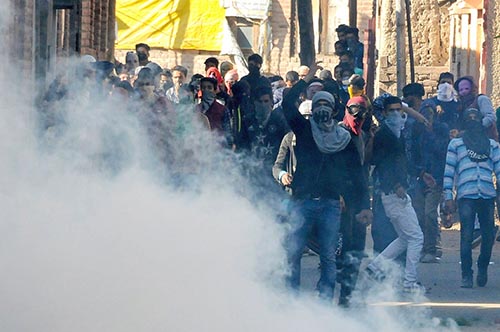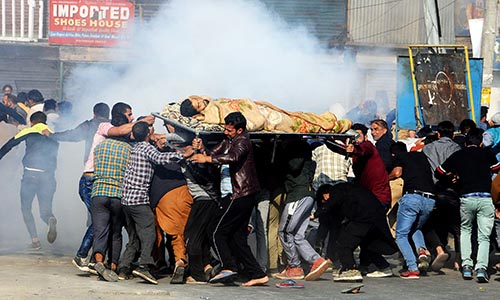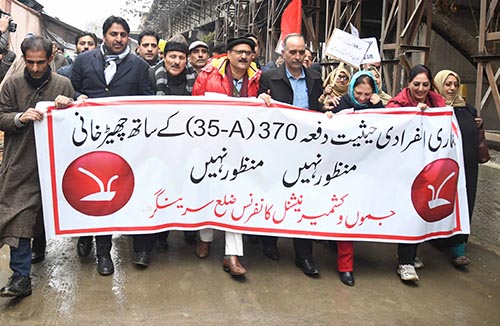The macabre cycle of violence unleashed by the Indian occupation forces in the disputed region of Jammu and Kashmir continues unabated. The total and veritable amalgamation of the region to the Indian dominion is being pursued at a break-neck speed as the world is oblivious to these radical changes that are being made in contravention to the International agreements and laws. The rate at which India is modifying the rules in occupied Kashmir, it is predicted that within the next year or two the demographic character, political landscape and property ownership in the region will be substantially altered and holding of plebiscite will become inconsequential. People who have visited the valley recently are aghast at the transformation that has occurred and the region from the point of entry resembles the holy Hindu city of Varanasi or Mathura rather than alluring picturesque visuals it presented in the not so distant past.
Grotesquely tragic experiences of the inhabitants of IOK (Indian occupied Kashmir) at the hands of occupation forces have been well documented and Khurram Parvez (who is currently incarcerated in a notorious Indian jail) has done a yeoman’s service for this cause. In the exhaustive report presented by Khurram and few others, the independence movement gained momentum in late 1989. This was triggered by the emergence of young Kashmiri leadership like Yasin Malik, Shabir Shah, Ashfaq Majid, who were convinced about the mala-fide intentions of the successive Indian governments and their nefarious designs to renege on the promise to uphold the UN resolutions in the territory. The peaceful resistance was met with overwhelming force and brutal assassinations in which youth were especially targeted. To sum it up, in the last three decades, the Indian forces have murdered about 130,000 youth, and gang-raped 11,300 Kashmiri women. Moreover, there are thousands of missing persons who were picked up by the armed forces. In a survey conducted by an Indian-born academician in the United States, thousands of mass graves were discovered and the investigation could not be completed as the Indian government booted her out of the country and cancelled the visa.
All the above happened under the watch of the Congress regime. Its policy was to meet the resistance with overwhelming force and crush the voices of independence. In 2014, the Congress government was replaced by the extreme rightist, Hindu fundamentalist party, called the BJP. Its strings are controlled by the Hindu extremist RSS that serves as the ideological fountainhead, believing that anybody residing in India has to embrace Hinduism. Under Prime Minister Narinder Modi, who is assisted by two hardline Hindu extremists, Home Minister Amit Shah and National Security Advisor Ajit Doval a plan was formulated by which the IOK would be stripped of its autonomous character and brought directly under the central rule. This plan was brought into action on August 5, 2019 when article 370 and 35-A were abrogated as two hundred thousand additional troops were deployed in the area and about 10,000 youth as young as 15 were whisked away from their homes and lodged with hardened criminals in various Indian jails.

The larger game plan of the BJP government is to change the demographic character of this Muslim-majority region so that the occupied territory becomes a Hindu majority state. In this regard, hundreds of thousands of Hindu fanatics from India have been provided residential status and the government is breaking all the barriers to facilitate them to acquire immovable property. Under the garb of discovering new Hindu religious sites, thousands of Hindus are being transported every month and efforts are made to build permanent settlements for their convenience. It is important to note that till recently about six lakh kanals of agricultural/horticulture land was under the unauthorized occupation of the Indian Army. These measures have proved to be a serious blow for the local population, who earn their livelihood from horticulture that amounts to 9.0 percent of the state’s gross domestic product. Draconian laws have been introduced which allow the occupation forces to grab private property without any legal recourse for the owner. Recently, the Indian government decided to cancel the lease of hoteliers and resort owners in the prime areas of tourist attractions like Gulmarg and Pahalgham. These individuals have invested substantial finances and labour to develop tourist infrastructure in these areas and their efforts have provided thousands of jobs to the local population. This iniquitous action is intended to distribute the property to Hindu outsiders and deprive the locals of the much-needed livelihood. This will further aggravate the situation for the locals, who are already suffering because of the growing unemployment. According to reliable sources, the Indian government plans to expand this land grab operation, or economic terrorism, soon to other areas, and the local population would be restricted to ghettos.

Although over the years numerous incisive articles on the issue of Kashmir occupation have been inked, they have failed to gain attention of the international community. During the decades of intrusion, incursion and invasion of this disputed territory, the repeated pleas to the United Nations have fallen on deaf ears as this protracted problem continues to fester threatening regional and world peace. As a Kashmiri, I find the role of the United Nations disappointing. The UN has just become a paper tiger that dances to the tune of superpowers. The role of the OIC (the Organisation of Islamic Cooperation) has been restricted to issuing mere statements with no result-yielding practical measures. In the current situation, the most disenchanting is the role of Pakistan — one of the important stakeholders. It is agonizing to say that Islamabad’s vision regarding IoK is misplaced, misconstrued and sluggish. Unfortunately, Kashmir watchers have to admit that Indian skullduggery and chicanery has succeeded, while the Pakistani Foreign Office has miserably failed to draw the world’s attention to the plight of the Kashmiris. The unrealistic belief of the successive Pakistani government that holding occasional demonstrations in their capital and some other cities on February 5 or October 27 will yield results is puerile and unrealistic. Although it may not be the view of the majority of Kashmiris, a sizable number of them believe that Pakistani politicians have betrayed their cause. This kind of thinking may be a stretch, but these apprehensions are not unfounded.

A glaring example in support of this argument is the episode when former premier Nawaz Sharif visited India during his third stint in power and on the advice of his Indian business partners, he did not meet Hurriyat leadership including stalwarts like Syed Ali Shah Geelani. To the chagrin of Kashmiris, some Pakistani politicians continue to partner with India in business deals undermining their national interests and even their country’s honour and pride. The proponents of extending commercial ties with India should remember that trade between the two countries is fostered by a conducive environment, trust and certitude. They should remember if a cracker bursts in a remote corner of India, the agencies will not blink to blame the intelligence agencies of Pakistan. Unless the Kashmir issue is resolved, trade relations with India would remain a far cry.
It is also important to mention that the former Army Chief of Pakistan, General Qamar Javed Bajwa issued statements in support for peaceful relations with India. Before issuing friendly overtures, the General should have taken into consideration the jingoistic statements emerging from New Delhi where there are no takers of peace and even mere talks with Pakistan. It is hard to believe that the General was unmindful of the policy detrimental to the interests of Pakistan being followed by the Indian leadership. What was aggravating for the people of Kashmir was the General’s statement that “past should be buried.” He may find comfort in these utterances, but people of Kashmir are not prepared to condone and bury the massacre of their youth or mass rape of their women by Indian forces.
The young foreign Minister of Pakistan Bilawal Bhutto-Zardari may receive plaudits for his recent exuberance and verbal dual with his Indian counterpart, but with due compliments to him, unfortunately such words are not a substitute to a cohesive Kashmir policy which Pakistan desperately needs. Jingoism or war of words has limited utility in international diplomacy and state relations. What will work is a firm and well-thought-out persistent short- and long-term policy aimed at countering the Indian propaganda and dis-information campaign as well as highlighting the Kashmir cause. Unless the world opinion changes, mere words and token protests will not provide succor to the sufferings of the people of Kashmir.
In fairness to the foreign Minister he alone is not to be blamed as the successive Pakistani governments have adopted a haphazard and slapdash approach on this issue. Perhaps, the minister should take lessons from some of the foreign policy gurus, who understand the complexity of the problem. It should be understood by not tackling the issue of IoK, Pakistan is not doing favor to people of that region. Larger plan of India is not to stop here, but usurp Azad Kashmir as well as Gilgit-Baltistan. Furthermore, there will be serious attempts to invigorate the secessionist movement in Balochistan. Undoubtedly, Pakistan faces an existential threat never contemplated or witnessed in the past. I hope that both the civilian and military leadership of Pakistan — despite their internal conflicts — rise to the occasion and defeat the heinous and evil designs of the Indian establishment. Like any Kashmiri, I can only pray for this to happen.



